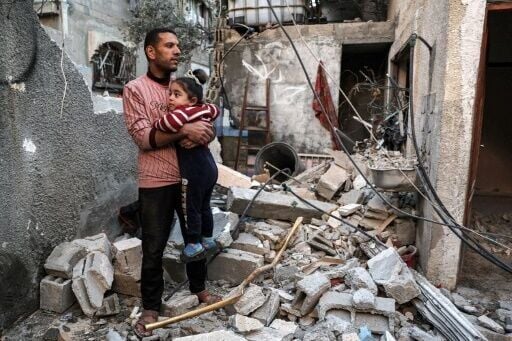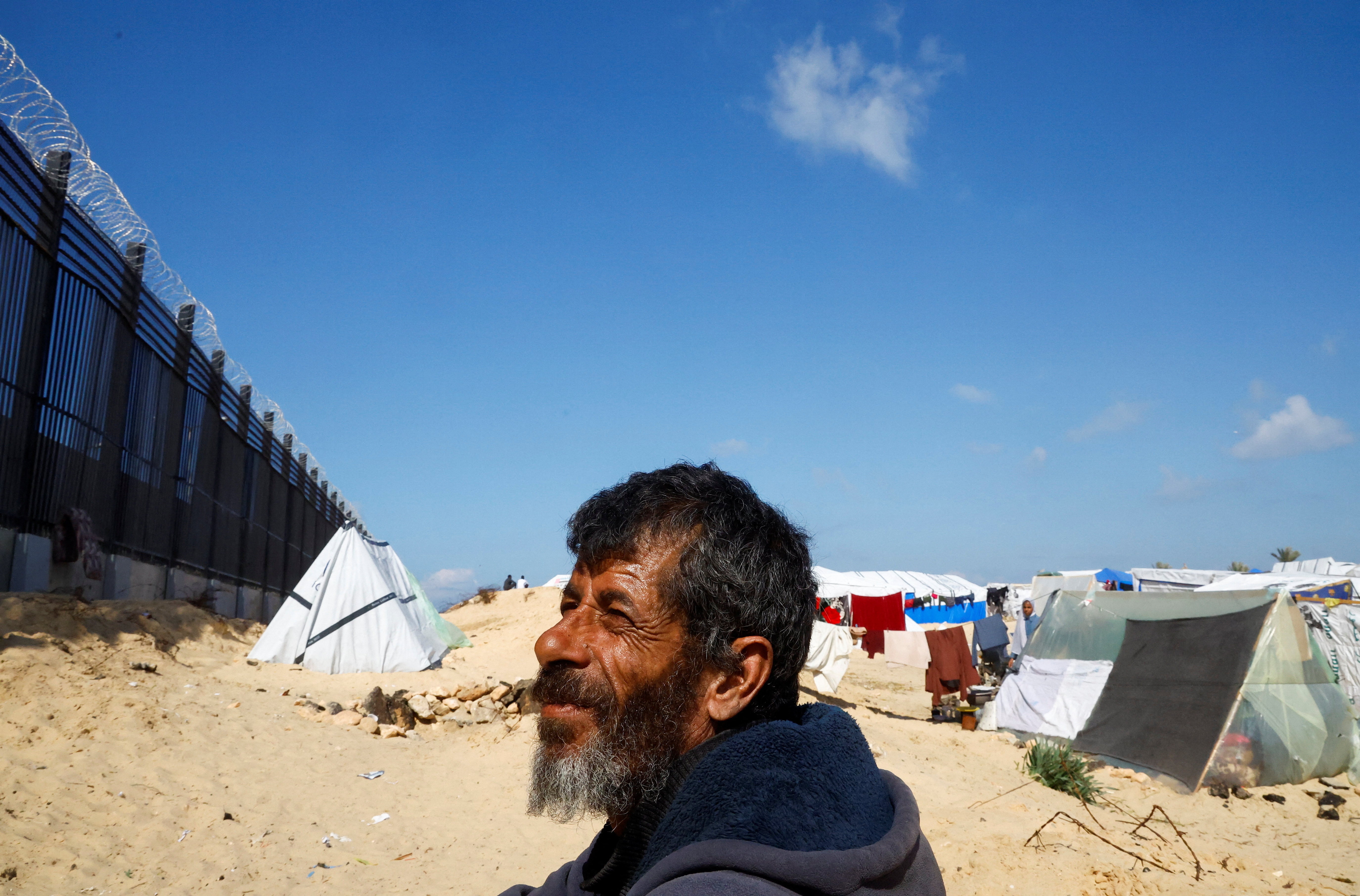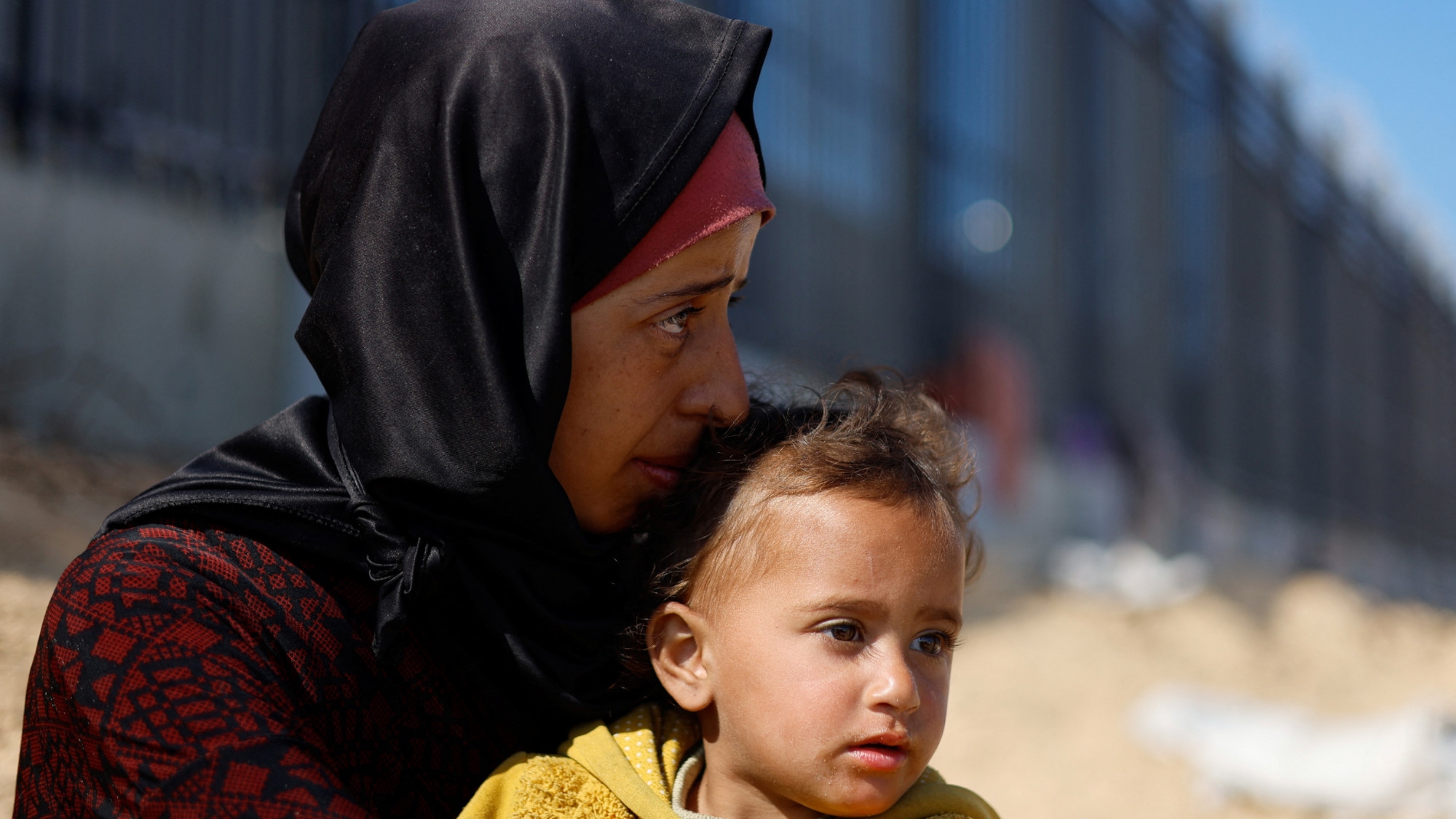News
Palestinians Sheltering In Rafah Fear Impending Israeli Ground Offensive

A Palestinian doctor in Rafah says locals are scared of an Israeli ground invasion in Gaza’s southernmost city following a night of some of the heaviest air strikes he has seen since arriving.
Dr Ahmed Abuibaid described the air strikes as relentless and widespread in a series of phone messages to the BBC overnight.
“[The] most popular question on people’s minds is, where can we go?” he said.
Last Monday, Israeli Prime Minister Benjamin Netanyahu declared that he had directed troops to prepare to expand their ground operation into Rafah.
Palestinians Sheltering In Rafah Fear Impending Israeli Ground Offensive
More than half of Gaza’s 2.3 million residents are now jammed into the city on Egypt’s border, which had a population of barely 250,000 before the Israel-Hamas war.
Many displaced people are living in improvised shelters or tents in deplorable conditions, with little access to safe drinking water and food.
On Monday, UN Human Rights Chief Volker Türk warned that an assault on Rafah would be “terrifying, given the prospect of an extremely high number of civilians, mostly children and women, being killed and injured.”
He also said that the “meagre” humanitarian aid being delivered to Gaza, which is now routed through the Egyptian-controlled Rafah border crossing, may end.
His warning comes after the US issued an unusually harsh critique of Israel’s military campaign in Gaza last week, with President Joe Biden calling it “over the top”. On Monday, Biden stated that Israeli actions in Rafah “should not proceed without a credible plan for ensuring the safety” of civilians.
Following a meeting with Jordan’s King Abdullah, Mr Biden stated that the US was working on a cease-fire agreement that would last “at least six weeks”.
Lord Cameron, the UK Foreign Secretary, has urged Israel to “stop and think seriously” before taking any additional action in Rafah.
On Monday, Josep Borrell, the EU’s foreign policy leader, urged Israel’s allies to cease delivering arms because “too many people” are being killed in Gaza.
In an interview with ABC News on Sunday, Mr Netanyahu stated that Israel was “working out a detailed plan” to relocate inhabitants to places north of the city.
“Victory is within reach,” he declared. “Those who say that under no circumstances should we enter Rafah are basically saying, ‘lose the war, keep Hamas there.'”
The Israeli military started a massive air and ground campaign in Gaza after Hamas terrorists killed over 1,200 people in southern Israel on October 7 and kidnapped 253 others.
According to Gaza’s Hamas-run health ministry, more than 28,100 Palestinians have been killed in the conflict since then.
Dr Abuibaid, one of the displaced individuals in Rafah, was forced to leave his job at Nasser Hospital in the nearby city of Khan Younis after his home was damaged by an Israeli air strike and his father suffered a devastating spine injury.
He now faces the potential of leaving Rafah, although it is still being determined where he may go safely.
“People are very scared about a possible military ground operation soon in the city,” he told reporters.
Overnight Israeli strikes on Sunday and Monday, carried out during an attempt to rescue two Israeli hostages, alarmed many people who had sought safety in the city.
Abo Mohamed Attya reported that he was sleeping in a tent with his family when he heard the bombing.
“Suddenly… missiles are being hit everywhere and firing as well and aeroplanes everywhere, all of this is on the tents and the people in the streets,” he was quoted as saying by the BBC.
Palestinians Sheltering In Rafah Fear Impending Israeli Ground Offensive
Mr Attya, who had previously fled the Nuseirat refugee camp in the heart of the Gaza Strip after receiving Israeli evacuation orders, stated that the Israeli military had given no notice that Rafah would be targeted overnight.
“We hoped for a warning to evacuate, as they did in Nuseirat, and went to Rafah.” We would have travelled outside of Rafah to anywhere they told us. We have no difficulty; we will evacuate for our children,” he added.
According to the Hamas-run Palestinian health ministry, at least 67 persons were killed in Israel’s bombings and hostage rescue raid in Rafah overnight.
“Nowhere is safe anymore; even hospitals are unsafe. “One hopes to die instead,” Mr Attya stated.
Severe living conditions in Rafah, such as limited access to water, food, and sanitation, as well as rapidly depleting medical supplies, are aggravating the situation in addition to the ongoing threat of Israeli air attacks and an anticipated ground operation.
Dr. Abuibaid stated that he had observed several ailments among Rafah residents, which had been compounded by the “severe decrease in the availability of drugs and treatment”.
Another medic in Rafah, who preferred not to be identified, told the BBC that many people were living in confined and unhygienic conditions.
“I live here with 20 people in two rooms… and I know people that are 100 people in three rooms.”
“We don’t have water to wash, we don’t have clothes, we don’t have the option to do hygiene stuff,” he added.
Palestinians Sheltering In Rafah Fear Impending Israeli Ground Offensive
“My friends, all of the people I meet… all of them are having at least flu, cholera, diarrhoea, scabies, hepatitis A – which is a newcomer for us – and it’s getting worse and worse.”
“And the aid is less as the siege is increasing, the war is increasing, [Israeli soldiers] are getting closer to Rafah, and it feels very scary right now”, he went on to say.
Despite being positioned adjacent to the only border point for goods and persons between Gaza and Egypt, Rafah has received insufficient aid to meet the needs of its residents.
According to one city resident, residents are currently waiting days for assistance delivery, and when they do arrive, there is a water shortage.
“We can’t find water, and we don’t get enough of it; our throats are dry as a result of the water shortage,” said another woman in Rafah.
The head of the United Nations Relief and Works Agency for Palestinian Refugees (UNRWA), the largest humanitarian organisation in Gaza, said on Monday that civil order was deteriorating, with members of the local Hamas-run police force being killed or refusing to protect aid trucks for fear of their safety.
For the first time yesterday, local police could only offer the bare minimum of protection to the UN. And because there were no local police, our trucks and convoys at the border were plundered, and hundreds of young people vandalised them.”
Still trying to figure out where to go.
For others of the displaced, however, dread of what might happen next outweighs daily concerns about getting safe drinking water and food.
“Before, we were concerned about famine due to a lack of food, water, and electricity. However, we are now traumatised about the next step and where to go. “This is our daily life right now,” Ibrahim Isbaita told the BBC.
When asked where he and his family would go if they left Rafah, Mr Isbaita replied, “I have no idea.”
He stated that his mother required dialysis therapy, which she is currently able to receive in Rafah when electricity is available – however, the treatment is less frequent than necessary. The fear is that if they relocate, she will be unable to find therapy in the new location.
“I live beside the hospital because of my mother, and we are trying our best to find a solution,” he said.
SOURCE – (BBC)
News
Britain Must Be Ready for War in 3 Years, Warns New Army Chief

The new head of the Army has stated that Britain must be prepared to fight a war within three years.
Gen Sir Roland Walker has issued a warning about a variety of risks in what he calls a “increasingly volatile” environment.
However, he stated that war was not inevitable and that the Army had “just enough time” to prepare to prevent conflict.
He stated that the Army’s fighting capacity would be doubled by 2027 and tripled by the end of the decade.
Gen Walker warned that the Britain was under threat from a “axis of upheaval” in his first speech as Prime Minister on Tuesday.
Among the primary concerns confronting the Britain in the next years, as noted by the general in a briefing, is an enraged Russia, which may seek vengeance on the West for helping Ukraine, regardless of who wins the war.
He stated: “It doesn’t matter how it finishes. I believe Russia will emerge from it weaker objectively – or completely – but still very, very dangerous and seeking some form of retaliation for what we have done to assist Ukraine.”
Britain’s Government Defence Review and Military Challenges
He also warned that China was determined to retake Taiwan, and Iran was likely to seek nuclear weapons.
He stated that the threats they posed may become particularly acute in the next three years, and that these countries had formed a “mutual transactional relationship” since the war in Ukraine, sharing weaponry and technology.
However, he stated that the path to conflict was not “inexorable” if the UK re-established credible land troops to assist its deterrent strategy for avoiding war.
In his speech, he described his force of slightly over 70,000 regular troops as a “medium-sized army” and made no direct call for additional resources or men.
However, he pushed the British Army to adapt swiftly, focussing on technology such as artificial intelligence and weaponry rather than numbers.
His ultimate goal is for the Army to be capable of destroying an opponent three times its size.
This would entail firing quicker and farther, he said, aided by lessons learnt from the Ukraine war.
The general’s speech at the Royal United Services Institute land warfare conference comes only one week after the government began a “root and branch” defence review to “take a fresh look” at the challenges facing the armed services.
Defence Secretary John Healey launched the assessment, describing the existing status of the armed forces as “hollowed-out” and stating that “procurement waste and neglected morale cannot continue”.
According to the most recent Ministry of Defence (MoD) numbers from April 2024, the Britain’s regular Army forces total 75,325 troops (excluding Gurkhas and volunteers).
That figure has been declining in recent years, as recruiting has failed to match retention. The previous Conservative administration lowered the planned headcount from 82,000 to 72,500 by 2025.
Members of the NATO military alliance have agreed to spend at least 2% of GDP on defence by 2024, but several countries are unlikely to fulfil this goal.
The Britain presently spends 2.3% of its GDP on defence. Prime Minister Sir Keir Starmer has previously stated that the defence review will include a “roadmap” for increasing this to 2.5%, however he has yet to provide a date for this promise.
Source: BBC
News
Katie Ledecky Hopes For Clean Races At Paris Olympics In The Aftermath Of The Chinese Doping Scandal

PARIS — Katie Ledecky is looking for clean Olympic races. On Wednesday, Hope had pretty much reached her limit.
The American swimmer hopes to add to her six gold medals as she competes in the 400, 800, and 1,500 meters at the Paris Games. Her program starts with the heavy 400 on Saturday, featuring Ariarne Titmus and Summer McIntosh.

Katie Ledecky | ESPN Image
Katie Ledecky Hopes For Clean Races At Paris Olympics In The Aftermath Of The Chinese Doping Scandal
The 27-year-old Katie is competing in her fourth Summer Olympics, but the first since a doping scandal involving almost two dozen Chinese swimmers who tested positive for a banned chemical before the Tokyo Games — yet were permitted to compete with no consequences. The controversy has raised serious worries regarding the effectiveness of anti-doping initiatives.

Katie Ledecky | Vogue Image
“I hope everyone here is going to be competing clean this week,” Ledecky claimed. “But what truly counts is, were they training cleanly? Hopefully this has been the case. Hopefully, there has been worldwide testing.”
The International Olympic Committee has expressed concern over the ongoing US investigation into possible doping by Chinese swimmers. While awarding the 2034 Winter Olympics to Salt Lake City on Wednesday, the IOC urged Utah officials to do whatever they could to stop the FBI investigation.
“I think everyone’s heard what the athletes think,” Katie added. “They seek transparency. They want more answers to the remaining questions. At this point, we are here to race. We are going to race whoever is in the lane next to us.
“We are not paid to conduct the tests, so we trust those who follow their regulations. That applies both today and in the future.

Katie Ledecky | ESPN Image
Katie Ledecky Hopes For Clean Races At Paris Olympics In The Aftermath Of The Chinese Doping Scandal
SOURCE | AP
News
London Heatwave Alert: High Temperatures Set to Soar to 29C Next Week

As the summer holidays begin, London may experience an official heatwave with temperatures reaching up to 29 degrees Celsius.
The Met Office predicts a long period of sunny and dry weather for London after a soggy spring and summer.
After a cloudy day on Saturday, temperatures are expected to reach 27C on Sunday, with lots of sunlight.
On Monday and Tuesday, temperatures are forecast to peak at 29 degrees Celsius. Monday is forecast to offer more sunlight, while Tuesday may see some gloomy weather.
Temperatures are expected to remain in the high 20s next week, with lows of approximately 18C.
According to the Met Office, a heatwave is “an extended period of hot weather relative to the expected conditions of the area at that time of year, which may be accompanied by high humidity.”
In the United Kingdom, a heatwave is proclaimed when daily temperatures meet or surpass a certain level for at least three consecutive days.
In London, the heatwave threshold is 28 degrees Celsius.
The Met Office reported that the UK is experiencing hotter and wetter weather on average due to climate change.
The UK experienced its warmest May and April on record this year, despite damp and dismal conditions in many areas.
According to the Met Office’s State Of The UK Climate 2023 report published on Thursday, the UK experienced historic levels of extreme weather last year.
In the United Kingdom, 2023 was the second warmest year on record, bringing storms, flooding, strong heatwaves, and rising sea levels; only 2022 was warmer.
It was 0.8°C higher than the average from 1991 to 2020, and 1.66°C higher than the 1961 to 1990 average.
However, 2023 will be a “cool year” in comparison to 2100, based on the planet’s warming trajectory.
The government’s plan to adapt to the hazards presented by climate change is currently being challenged in the High Court by campaigners who allege the Tory administration’s July 2023 National Adaptation Programme (NAP) fails to adequately address 61 concerns.
Source: The Standard
-
World2 weeks ago
Former President Trump Survives Being Shot at Pennsylvania Rally
-
Tech4 weeks ago
Huawei Launches 5G-A Pioneers Program at MWC Shanghai 2024: Paving the Way for a Connected Future
-
Sports4 weeks ago
NBA Draft: Kyle Filipowski Withdraws Unexpectedly From The First Round
-
Tech4 weeks ago
ChatGPT Answers Undiscovered Questions and Outperforms Students.
-
News4 weeks ago
US Supreme Court Rejects Drug Deal that Protects the Sackler Family
-
Health4 weeks ago
US Health Agency Issues Dengue Virus Infection Warning





















